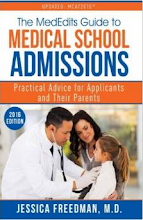I wanted to offer congratulations to all MedEdits medical school clients who have
interviews and
medical school acceptances. As of November 3rd, 2009, many of our clients have multiple interviews and accpetances. Below is our impressive list of where our clients have interviews and where they have received accpetances (bolded).
I will be attending the
Association of American Medical Colleges meeting later this week to stay up to date on all of the advances and trends in medical education and will be out of the office.
Albany Medical College
Albert Einstein College of Medicine
Baylor College of Medicine
Boston University School of Medicine
Brown/Warren Alpert School of Medicine
Case Western Reserve School of Medicine
Columbia University College of Physicians and Surgeons
The Commonwealth Medical College
Creighton School of Medicine
Dartmouth Medical School
Drexel University College of Medicine
Duke University School of Medicine
Eastern Virginia Medical School
Emory University School of Medicine
Florida International University College of Medicine
Georgetown University School of Medicine
The George Washington University School of Medicine and Health Sciences
Harvard Medical School
Indiana University School of Medicine
Jefferson Medical College
Loyola University Chicago School of Medicine
Mayo School of Medicine
Medical College of Wisconsin
Mount Sinai School of Medicine
New Jersey Medical School
New York Medical College
New York University School of Medicine
Northwestern University Feinberg School of Medicine
The Ohio State University College of Medicine
Oregon Health & Science University School of Medicine
Pennsylvania State University School of Medicine
Pritzker School of Medicine, University of Chicago
State University of New York Downstate Medical Center College of Medicine
Rosalind Franklin/Chicago Medical School
State University of New York at Buffalo School of Medicine
Stony Brook University School of Medicine
Temple University School of Medicine
Texas A & M University System Health Science Center College of Medicine
Texas Tech University Health Sciences Center School of Medicine
Tufts School of Medicine
Tufts School of Medicine - Maine Track
Tulane University School of Medicine
Uniformed Services School of Medicine
University of Alabama School of Medicine
University of California, Davis, School of Medicine
University of California, Irvine, School of Medicine
University of California, Los Angeles, David Geffen School of Medicine
University of California, San Diego, School of Medicine
University of California, San Francisco, School of Medicine
University of Connecticut School of Medicine
University of Illinois College of Medicine at Chicago
University of Iowa College of Medicine
University of Kentucky School of Medicine
University of Maryland School of Medicine
University of Medicine and Dentistry of New Jersey
University of North Carolina at Chapel Hill School of Medicine
University of Pennsylvania School of Medicine
University of Pittsburgh School of Medicine
University of Rochester School of Medicine and Dentistry
University of Tennessee College of Medicine
University of Texas School of Medicine at Houston
University of Texas Southwestern Medical School
University of Toledo School of Medicine
University of Vermont College of Medicine
University of Virginia School of Medicine
Vanderbilt School of Medicine
Virginia Commonwealth University School of Medicine
Virginia Tech School of Medicine
Washington University School of Medicine
Wayne State School of Medicine
Weill Cornell Medical College
West Virginia University School of Medicine
Wright State University School of Medicine
Yale University School of Medicine
I am now starting to work with clients applying to medical school in 2010.
Visit:
MedEdits























